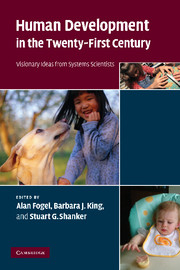Book contents
- Frontmatter
- Contents
- List of contributors
- Introduction: Why a dynamic systems approach to fostering human development?
- Part I Dynamic relationships between genetics and environments
- 1 Developmental dynamics: the new view from the life sciences
- 2 Genes, experience, and behavior
- 3 How dynamic systems have changed our minds
- 4 Individual development as a system of coactions: implications for research and policy
- 5 Gene–environment interactions and inter-individual differences in rhesus monkey behavioral and biological development
- Part II The dynamic system of the child in the family
- Part III The dynamic system of the child in social and physical environment
- Part IV Dynamic systems approaches to mental health
- Part V Conclusions and outlook
- Index
- References
2 - Genes, experience, and behavior
Published online by Cambridge University Press: 22 September 2009
- Frontmatter
- Contents
- List of contributors
- Introduction: Why a dynamic systems approach to fostering human development?
- Part I Dynamic relationships between genetics and environments
- 1 Developmental dynamics: the new view from the life sciences
- 2 Genes, experience, and behavior
- 3 How dynamic systems have changed our minds
- 4 Individual development as a system of coactions: implications for research and policy
- 5 Gene–environment interactions and inter-individual differences in rhesus monkey behavioral and biological development
- Part II The dynamic system of the child in the family
- Part III The dynamic system of the child in social and physical environment
- Part IV Dynamic systems approaches to mental health
- Part V Conclusions and outlook
- Index
- References
Summary
My aim in this chapter is to provide some guidance for thinking about the ways in which genes contribute to the development of behavior. The more we learn about the science of developmental behavior genetics, the clearer it becomes that every behavior includes some genetic influence – there is undoubtedly no such thing as a completely non-genetic pattern of behavior. The question for behavior is not whether genes are involved in its development, but which genes are involved and how they exert their influence. In the past decade, geneticists have made great strides in identifying genes that affect various forms of behavior and in unraveling at least some of the details of how they do so. As a result, it has become clear that we have to change some of the ways we think about genes and their influence on behavior.
People often write and think about the way genes and environment (or experience) contribute to behavior as if these two influences work separately, sometimes even in opposition to one another. We read of findings supposedly showing that a psychological disorder previously thought to result entirely from experience is in fact partly genetic. Or we hear that the extent to which heredity influences a personality trait is greater than previously thought, the implication being that experience is thereby shown to be less important.
- Type
- Chapter
- Information
- Human Development in the Twenty-First CenturyVisionary Ideas from Systems Scientists, pp. 18 - 24Publisher: Cambridge University PressPrint publication year: 2007



